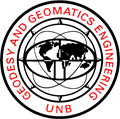Prof. Richard B. Langley
For his contributions to GPS education for specialists and his research advances in many areas including atmospheric delay modeling, and advancing the knowledge of GPS in society.
Prof. Langley is a full professor at the Department of Geodesy and Geomatics Engineering at the University of New Brunswick, where he is the senior member of the Geodetic Research Laboratory and has conducted GPS-related research and teaching for more than twenty years.
Prof. Langley has worked extensively with the Global Positioning System. He is a co-author of the best-selling the Guide to GPS Positioning published by Canadian GPS Associates and has been a columnist and contributing editor of GPS World magazine since its inception. The material developed for Prof. Langley's academic, private and public lectures were also directed to contributing chapters in the 1996 book GPS for Geodesy. His research team is currently working on a number of GPS related projects including the study of atmospheric effects on WAAS and the development of applications for spaceborne GPS.
Prof. Langley's involvement with GPS started as a post-doctoral fellow at MIT with the Department of Earth and Planetary Sciences where he carried out research in geodetic applications of lunar laser ranging and very long baseline interferometry (VLBI). For work in VLBI, he shared two NASA Group Achievement Awards. He joined Dave Wells and Petr Vaníček at UNB in 1981 to expand an early GPS research program. The mid 1980s saw this partnership develop DIPOP, the UNB static GPS data processing software package, which has evolved over the years to become a powerful analysis tool. This research also produced partnerships with the University of Bern and aided in their GPS program.
With interests in virtually all high-precision applications of GPS, Prof. Langley oversaw the development of the UNB-RTK system which is being used for machine control, deformation monitoring, and other applications.
Prof. Langley has mentored many undergraduate and graduate students over the years. A number of these former students have gone on to make their own marks in the GPS community.
Prof. Langley has a B.Sc. in applied physics from the University of Waterloo and a Ph.D. in experimental space science from York University, Toronto. Prof. Langley has co-chaired numerous sessions at the meetings of The Institute of Navigation and served as a track chair for ION GPS/GNSS 2003. He has also won 3 "Best Papers in Session" awards from the ION.


